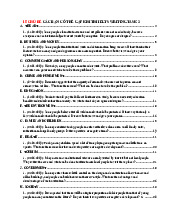


Preview text:
WRITING
1. Work after high school?
It goes without saying that education plays an imperative role as a continuous process
throughout one’s life and contributes to their personal development. There is an opinion
that students should seek job opportunities after leaving high school while those who
disagree attach great importance to tertiary education. This essay will examine both sides
of the issue, followed by my own perspective.
Starting to work after graduating from high school is advantageous for several reasons.
First and foremost, it enables students to earn a living for themselves and be financially
independent of their parents. For instance, research has shown that the majority of
employed school-leavers can receive up to $1000 per month, which is sufficient to
provide financial aid for their entire family. Furthermore, they could gain hands-on
working experience that is liable to come in handy later on in life. Therefore, establishing
a career at the age of 18 is likely to bring about a number of benefits for the young.
On the contrary, instead of getting employed, students need to pursue third-level
education because it would be a more auspicious choice. Firstly, it provides exclusive
expertise for students who demand higher levels of education. To cite an example, certain
professions might require a certificate prior to recruitment, so individuals will lose out if
they fail to fulfill these requirements. Secondly, university education assists students in
gaining insights into advanced knowledge, which exposes them to new horizons. Thus,
they ought to focus more on their education pathway because it lays the foundation for long-term success.
In conclusion, although people’s viewpoints differ as to whether working or studying
should be prioritized upon high school graduation, I still believe that education has a
predominant position in each individual’s growth. Students can engage in part-time
employment during their college years to balance the two aspects. 2. Homework?
It goes without saying that homework plays an imperative role as a method of assessment
throughout one’s education and contributes to their personal development. There is an
opinion that students should be given homework by their teachers, while others argue
they are not supposed to handle any extra tasks after school. This essay will examine both sides of the issue.
Homework is a heavy burden on students for a number of reasons. It barely improves
educational outcomes since teachers excessively concentrate on acquiring teaching
achievements and pay little attention to their students’ concerns. Countries such as
Finland, where homework was abolished long ago, regularly top international educational
ranking and outperform nations where homework is applied. Furthermore, many parents
agree that the school day is already long enough, and their children deserve to have the
remaining time for extra-curricular activities or their beloved ones rather than struggle to
do difficult exercises for hours. Therefore, the downside of homework needs to be taken
into consideration to prevent negative effects on learners.
Despite the preceding arguments, homework brings about an array of benefits in the
schooling of students. The major advantage of home-based assignments is that it
promotes independent learning as students are required to work things out alone using
their own capability. In doing so, students must apply the knowledge that they learned in
class. For instance, by completing exercises at home, students reinforce their
comprehension of the concepts taught by their teacher at school. Thus, homework is
necessary for children to develop an independent study habit because this assists them in
preparing to work alone as adults later on in life.
In conclusion, although people’s viewpoints differ as to whether or not school children
should be given homework, I still believe that it is a crucial aspect of education.
However, the amount of homework ought to be moderate and reasonable so as not to put students under pressure.
3. Some people think that it is beneficial for old people to learn something new while
others believe that once a person in the past 65 years of age it is too late to learn. What’s your opinion?
There is an undoubted fact that learning plays an imperative role as a continuous process
throughout one’s life and contributes to their personal development. Some people
consider it as a great boon to the elderly, whereas others believe education is futile and
late after a certain age limit. This essay will examine both sides of the issue, followed by my own perspective.
Acquiring knowledge is highly recommended among people of advanced years.
Maintaining the practice of learning could keep their brain functioning properly and slow
down the aging process. To illustrate, a recent study has indicated that the majority of
senior citizens who engage in learning activities have a tendency to live longer and are
less likely to suffer from mental illnesses such as Alzheimer’s disease. Learning also
provides opportunities to entertain themselves, boosts their intelligence and forestalls
feelings of depression. Therefore, they should be encouraged to be open-minded about
new information in order to catch up with the latest trends of society.
On the contrary, learning might prompt several issues for the aged. The fact that some of
them are so engrossed in such activities has engendered a breakdown in the family bond.
For instance, if learning is prioritized, they will spend less time with their beloved ones
and this gradually causes domestic conflicts. Furthermore, when people reach old age,
their mental health begins to deteriorate. This means their ability to absorb knowledge is
not as fast and effective as when they were younger. Thus, the purposes of education for
seniors have to be scrutinized carefully before it is implemented, and old people should
know how to derive pleasure from other activities aside from learning.
In conclusion, although there are still some controversies surrounding education for
elders, its advantages are strongly advocated by many people. From my standpoint, old
people reserve a fundamental right to pursue their learning demands, so nobody can
impose any prohibitions on them. Learning ought to be universal and promoted regardless of age. 4. Space exploration
Over the last few years, space exploration has been among the most intriguing topics all
over the world as it always draws public attention. Some people consider that it has
served humanity in numerous aspects, whereas others view this development merely as
budget squandering and believe we should solve problems on Earth before carrying out
space missions. The two sides of the issue will be discussed in this essay.
The pursuit of space discovery has greatly contributed to the evolution of our civilization.
Many of the technologies we take for granted today exist thanks to space research. For
example, without satellites, we would neither be able to keep track of global events nor
give citizens any warning of approaching natural disasters. Besides, we could gain access
to a valuable and fascinating source of knowledge about outer space. Therefore, the
challenge of dispatching human beings into space has driven new scientific development that enhances our daily lives.
On the contrary, it is also assumed that space exploration is superfluous and
unproductive. Until all urgent matters of the globe have been tackled, money and time
spent on space programs are meaningless. For instance, billions of dollars has been
wasted due to failure in launching spacecraft, while approximately 25000 people die from
lack of food and money every day. Furthermore, space exploration might pose certain
threats to mankind such as a violent encounter with extra-terrestrial forces. Thus, the
purposes of space campaigns should be scrutinized carefully before the money is wastefully invested.
In conclusion, although there are still some concerns regarding the practicality of space
exploration, its advantages are advocated by many people. I strongly believe it will
facilitate further technological advances and provide possible refuge in case Earth
becomes uninhabitable in the future. All countries ought to join forces in the advancement of space research.




